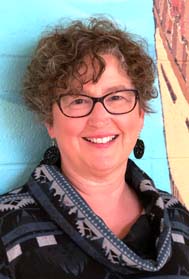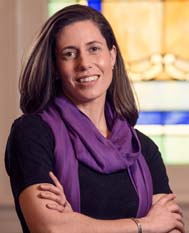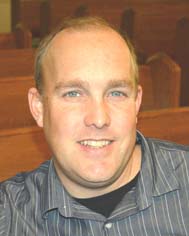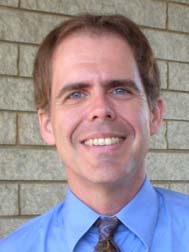
program & arrangements committee
beth jarrett
Annual Conference is both a rock of ages and an agent of new community as we move online in 2021, and as first-timers attend every year. What AC practices, old and new, hold the greatest promise for uniting, strengthening and equipping the church to follow Jesus?
Oh there are so many things to love and look forward to about Annual Conference each year no matter how or where it takes place. For me, the most powerful practice of Annual Conference is worshipping together each evening. Singing old favorites and learning new songs are always a highlight. I especially appreciate hearing from a variety of persons in our denomination. These times of worship are not only a time of building our faith and renewing our zeal in Jesus Christ, but the Holy Spirit forges a bond between us which is really amazing when I consider how vastly different each of us are!
In addition, I greatly appreciate the table talk during the business sessions… especially now that they have added tables for non-delegates. As the Body of Christ, we do not make decisions in a vacuum…instead, we do the hard but enriching work of opening ourselves to new ideas and ways of thinking and seek to find common ground on tough issues. Together, with the help of the Holy Spirit, we discuss matters of faith. This practice is a benchmark of Christian faith that we see over and over in the New Testament…it wasn’t always easy, but with the help of the Holy Spirit the New Testament Church was able to navigate uncharted territory through the guidance of the Holy Spirit and through listening to the stories of the other.
What is the role of Annual Conference worship within the denomination? How can it best be made meaningful for both fresh Brethren and cradle Brethren?
In the past, Annual Conference was often held during Pentecost with an invitation for the Holy Spirit to reinvigorate the believers present. I believe this important aspect remains true even today. We may not meet on Pentecost Sunday, but our worship together invites the spirit to bring renewal among us through the preaching of the word, prayers together and of course, singing! We celebrate who we are in Christ and re-covenant together to remain faithful to the call God has on us collectively as well as individually. This is especially important following our query process, which can be sometimes difficult and unsettling. And yet, at the end of each day, we focus on Jesus in our worship together and give space to the Holy Spirit to move among us. When we attend Annual Conference worship with this attitude, it is meaningful for all walks of life: cradle Brethren as well as fresh Brethren.
AC worship and event planning frequently rely on personnel from near the conference location (which has been weighted heavily to Grand Rapids and Greensboro). How can P&A include voices/cultural practices from areas of the country that will likely will not host an AC?
Diversity can be tricky…and yet the New Testament church was diverse! When our worship is lacking the voice of the other, it becomes flat, predictable and boring. In order to remain vibrant and vital, we must be intentional about giving those not often included for geographical reasons, cultural reasons or any other reason, a place at the table when it comes to worship and event planning for Annual Conference. From my previous experience planning worship for Annual Conference, I learned how important it is to listen and incorporate those who have a different perspective from the very beginning of the process. Of course, as details begin to be filled in during the process, we must continue to include a wide variety of voices and practices – not only as scripture readers but worship planners who shape how we worship.
I often use the image of a stained glass window when thinking of worship and the body of Christ. What makes a stained glass window beautiful are the different sizes, colors, and shapes of the glass that come together to paint a picture of Jesus. There can be no image of Jesus if all of the glass is the same color, size, texture and shape. I believe the same is true for our worship planning process.
Tell us about a context in which you are/were a minority (longer than a weeklong workcamp).
My family and I served and lived in Sicily, Italy for ten years. Our children attended Italian public schools and we formed many long-lasting relationships with the people in our community. We learned what it was like to depend on others for nearly everything… even when we were supposed to be “helping and serving” others. Of course, the first several years were difficult as we learned the language and would often make some huge language blubbers. We felt the frustration of not being able to express ourselves the way we wanted to… as well as feeling misunderstood and excluded because we had an accent.
However, we were the fortunate ones as we received grace upon grace from our Italian brothers and sisters. We learned what Paul meant when he wrote in Romans: “Do not think of yourself more highly than you ought, but rather think of yourself with sober judgment, in accordance with the faith God has distributed to each of you.” We learned to value the gift and beauty God has placed in all people. Through the hospitality of the Italians, we experienced what it means to be hosted with grace and love. We also learned how to be vulnerable and how painfully self-sufficient and haughty we Americans can be in almost any context. These are lessons I hope and pray will continue to form me.
Each candidate was asked the same questions, with one final unique question drawing on their profile.
Whether you’re planning worship, picking choir anthems, or developing goals for youth ministry, how do you blend/balance what is comfortable/familiar with what is creative/innovative?
I often go back to an image of a swing that I heard in my seminary days when it comes to balancing the past, present and future in any given ministry context. Nothing is better than swinging from a good old tree swing… up to the highest places as if I would launch into heaven itself… back to the comfort of having my feet on the ground and then leaning way back into the past which gives me a bird’s eye perspective of where I am going. It’s the back and forth that makes swinging exciting. It would be a sad ride if we only went forward, or only went backwards or worse yet…stayed still with our feet on the ground. But it is the entire movement that takes our breath away and sends us on an adventure. For me this image captures the importance of balance…the importance of being rooted in ancient Christian practices and biblical principles, living out our faith in our current context and allowing the Spirit to lead us into new and exciting adventures. I believe it is important to be intentional about including all of these when planning worship, youth ministry, a sermon, or just life together as the body of Christ.




 What does the feminist movement mean today?
What does the feminist movement mean today? 
